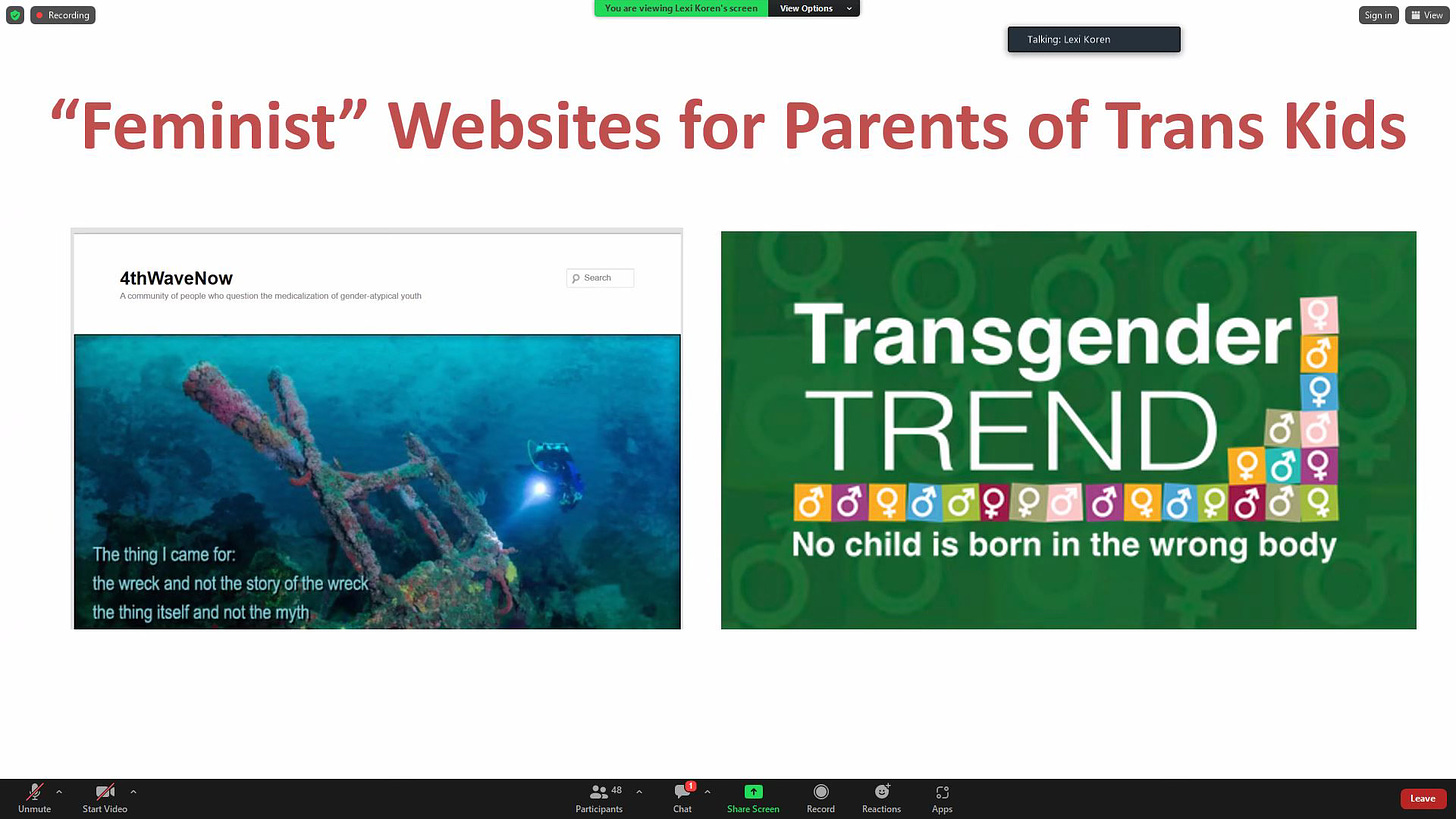Note: In a striking display of irony, the William Alanson White Institute of Psychiatry, an establishment renowned for its commitment to psychoanalytic innovation, hosted a Zoom event last Wednesday titled "The Global Assault on Youth Gender-Affirming Care: How Opponents Hijacked the Narrative."
Lexi Koren presented their ‘research.’ Koren, a staunch advocate for gender-affirming puberty blockers, cross-sex hormones and surgery, declared it "the only thing that works" and rejected any opposition to this idea as junk science or transphobia.
What follows are slides and audio that were leaked to us and a review by a member of the Courage Coalition.
The recent presentation featuring Lexi Koren and hosted by Willa France came at a pivotal moment: Just days after the Supreme Court heard arguments in Skrmetti v. United States. This case, which challenges state bans on “gender-affirming care” (GAC) for minors, saw a key admission from Chase Strangio, a prominent advocate for transgender rights. Strangio admitted that there is no conclusive evidence that GAC reduces suicide rates among transgender youth. This revelation is not just a technicality—it strikes at the heart of the “life-saving” justification often used to defend transitioning minors.
Despite this, Koren and France pressed forward with a presentation that framed dissent as ignorance and critique as bigotry. This was not an open conversation; it was a tightly controlled narrative, designed to affirm a single viewpoint. In doing so, it skirted the critical question at the heart of the debate: Should minors—whose understanding of identity and long-term consequences is still developing—be allowed to undergo irreversible medical transitions?
Let’s begin with the tone set by Willa France:
“Before I turn the mic over to Lexi, I want folks to know that, um, as the host this evening, and because we have so many people signed up, um, we're going to do questions, if you have them, when you hear what Lexi has to say, put them in the chat. I'll go through the questions and I'll read the questions out to Lexi rather than bombarding her with what might be an absolute deluge of questioning.
Um and the other thing is: Please. We're here to listen to what Lexi has to say. We're not here to grandstand. We're not here to promote particular ideologies, um, especially ideologies represented by SEGM. There are a number of SEGM folks in the audience. They will not be called upon.”
This was less of a discussion and more of an indoctrination session. Questions were screened, dissenters were preemptively sidelined, and the event unfolded, echo-chamber style. It also managed to shoehorn in a reference to Donald Trump’s re-election—as though the rise of skepticism around youth GAC were some partisan byproduct of his presidency.
This framing is not only reductive but historically inaccurate. Questions about transitioning minors existed long before Trump, and they will persist long after. By dragging Trump into the discussion, France trivialized the genuine and legitimate concerns of people across the political spectrum.
Koren’s presentation followed a similarly exclusionary approach. Koren began by invoking the history of transgender healthcare, tracing its origins to figures like Harry Benjamin. While Benjamin’s work undoubtedly laid the foundation for modern treatments, Koren cherry-picked his legacy, ignoring the caution and rigorous gatekeeping that characterized early approaches. Back then, clinicians attempted to follow more meticulous guidelines to ensure that only the rare adults with persistent, well-documented dysphoria underwent medical transition. Today, those safeguards have been sidelined in favor of a far more permissive model that seems to encourage minors to cast all caution aside.
Koren’s defense of puberty blockers is emblematic of this shift. Koren described them as a “pause button,” a safe and reversible intervention that gives children time to explore their identities. But the empirical evidence does not support this narrative. Puberty blockers are not neutral. They come with risks, including impacts on bone density, brain development, and fertility. Moreover, the vast majority of children who begin puberty blockers progress to cross-sex hormones, making the claim of reversibility questionable at best. These treatments often set minors on a medicalized path from which there is no easy return—a fact Koren glossed over entirely.
Then there’s the “life-saving” argument. Koren repeated this claim throughout the presentation, asserting that denying access to gender-affirming care would lead to suicides among transgender youth. This assertion is emotionally charged but unsupported by robust evidence. As Strangio admitted during the Skrmetti oral arguments: No conclusive data links GAC to reduced suicide rates. What we do know is that suicidality among transgender youth is multifactorial, most often tied to coexisting conditions like depression, anxiety, trauma, or autism. By framing medical transition as the sole remedy, Koren ignored the complexity of these cases and the potential for alternative, less invasive forms of support.
Dismissing detransitioners further undermined Koren’s credibility. While briefly acknowledging their existence, Koren framed detransition as an anomaly, driven largely by external pressures or political motivations. This characterization is not only skewed but it is insulting to those who have come forward about their experience. Detransitioners frequently describe feeling rushed into irreversible decisions without adequate psychological evaluation or exploration of underlying issues and wishing that someone had put the brakes on. Their stories are not outliers—they are warnings that the current system prioritizes affirmation over caution, often at the expense of vulnerable young people.
Perhaps the most glaring omission in Koren’s presentation was the growing demographic shift in adolescent gender dysphoria. The sharp rise in cases among teenage girls has led many to question whether social contagion—amplified by peer influence and social media—is contributing to the trend. Rather than addressing the phenomenon known as Rapid Onset Gender Dysphoria or ROGD, Koren dismissed such concerns as reactionary or anti-trans, ignoring the possibility that some adolescents may be seeking medical transition for reasons unrelated to intrinsic gender dysphoria.
Overall, the lack of curiosity around this contentious issue was both striking and troubling.
Finally, Koren resorted to ad hominem attacks when discussing critics like SEGM and Michael Bailey. Rather than engaging with their evidence-based critiques, Koren mocked their affiliations and dismissed their work outright. This is not the behavior of someone confident in their position—it is the hallmark of a defensive advocate unwilling to confront inconvenient truths. If the evidence for transitioning minors is as strong as Koren claims, why rely on character assassination to defend it?
The conversation between France and Koren encapsulates the problem with the current approach to youth gender-affirming care. Far from being a nuanced discussion, it was a one-sided affirmation of a controversial practice that leaves no room for skepticism or debate. Yet the stakes are too high for such intellectual laziness. The issue of transitioning minors needs to be approached ethically and with sound evidence.
Minors lack the maturity and life experience to fully understand the long-term consequences of medical transition. Interventions like puberty blockers and cross-sex hormones carry risks that we are only beginning to understand. And the voices of detransitioners, who have lived through the fallout of ideological pressure and rushed decisions, demand serious attention.
Youth “gender-affirming care” is not a one-size-fits-all solution, nor should it be treated as such. The ethical path forward is clear: Protect children from irreversible treatments until they are old enough to make informed decisions as adults. This is not a denial of care—it is a commitment to safeguarding the well-being of vulnerable young people in the face of mounting evidence that today’s permissive model—perpetuated by echo-chamber presentations like this one—is failing them.









"We want a respectful conversation, but if you're with SEGM we don't want to hear from you."
Respect, indeed.
If it sermonizes like a cult, suppresses dissent like a cult, and denounces heretics like a cult… it’s a cult.
A very powerful, very influential cult. One that holds sway over nearly every public institution.
I was also gobsmacked by Strangio’s admission, and by the total lack of interest in this “smoking gun” moment. Thank you for mentioning it here.